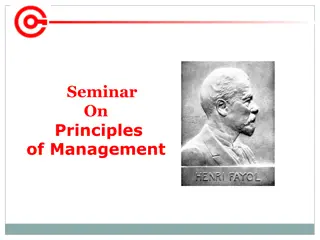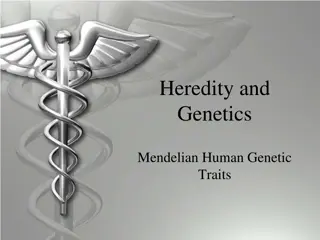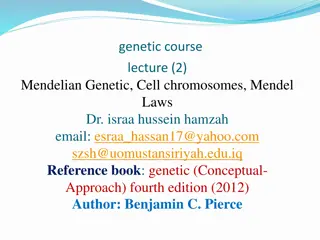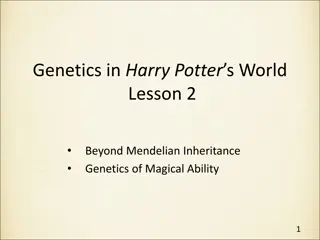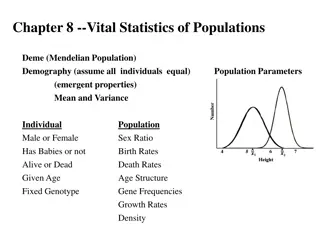ILO Fundamental Principles and Rights at Work
Explore the 5 fundamental principles and rights at work outlined by the ILO, emphasizing social justice and decent work. Delve into how these principles connect with ILO conventions and discuss challenges in their application to Pacific Island Countries.
0 views • 15 slides
Understanding Open Government Data Principles and Benefits
Open Government Data (OGD) principles and policies play a vital role in promoting transparency, citizen engagement, innovation, and data-driven decision-making in government operations. Governments worldwide are adopting open data policies to enhance accessibility, reusability, collaboration, privac
0 views • 36 slides
Principles of the Ghana Civil Service Code of Conduct
The Code of Conduct for the Ghana Civil Service, outlined by Elizabeth Obeng-Yeboah, emphasizes principles such as abiding by the constitution and laws with dignity, integrity, and professionalism. It sets standards for conduct, avoiding conflicts of interest, maintaining political neutrality, and u
1 views • 34 slides
Genetic Testing in Chronic Kidney Disease (CKD): Insights and Applications
Genetic testing plays a crucial role in identifying inherited kidney diseases, with around 15% of CKD cases having monogenic causes. Despite a high percentage of patients reporting a family history of CKD, Mendelian causes only account for about 10% of adult ESRD cases. Understanding the genetic bas
1 views • 52 slides
InterManager's General Principles of Conduct and Action
InterManager, a prominent trade association in the shipping industry, has established General Principles of Conduct and Action to uphold ethical standards, promote safety, environmental protection, and continuous improvement. These principles guide members towards integrity, professionalism, and acc
2 views • 72 slides
Advocating Together for Academic Freedom - Importance and Principles
Advocating for academic freedom is crucial for the advancement of knowledge and quality education. The American Association of University Professors (AAUP) champions academic freedom, shared governance, and economic security for faculty members. The 1940 Joint AAUP/AAC&U Statement of Principles on A
4 views • 14 slides
Understanding the Core Principles of the 2030 Agenda for Sustainable Development
Explore the key features and principles of the 2030 Agenda for Sustainable Development with a focus on its core principles of Universality, Leaving No One Behind, Interconnectedness and Indivisibility, Inclusiveness, and Multi-stakeholder Partnerships. This comprehensive agenda encompasses 17 Sustai
5 views • 11 slides
Understanding Business Ethics Theories and Principles
Explore various business ethics theories including Ethical Concepts, Moral Behavior Development, Ethical Principles, and the Role of Ethics in Business. Delve into the concept of ethics, moral behavior evolution, ethical principles like autonomy, honesty, justice, and integrity, and the importance o
10 views • 17 slides
Academic Freedom and Shared Governance in Higher Education
Academic Freedom and Shared Governance are foundational principles advocated by the American Association of University Professors (AAUP) to ensure educators have the freedom to explore, research, teach, and discuss without censorship. These principles empower educators to enhance student learning an
0 views • 9 slides
Essential Principles of Management Discussed in Seminar
Explore the foundational principles of management discussed in a seminar on principles of management. Delve into topics such as division of work, authority, discipline, unity of command, and unity of direction as outlined by Henri Fayol. Gain insights into the importance of these principles for effe
0 views • 22 slides
Understanding Neuroplasticity: 10 Principles for Brain Rehabilitation
Explore the 10 principles of neuroplasticity for brain rehabilitation, including key concepts like "use it or lose it," specificity of exercises, and the importance of salience and intensity in therapy. Learn how practicing skills can strengthen neural connections and how therapists can help manage
6 views • 13 slides
Principles of Advanced Forest Management
Explore sustainable forest management theories, inventory methods, yield regulation approaches, and project planning for effective decision-making in forest resource management. Delve into the principles of forest management, land classification, growth projection, yield prediction, and sustainable
0 views • 26 slides
Counting Principles and Pigeonhole Principle Explained
Explore the concepts of counting principles and the pigeonhole principle through practical examples and tips. Learn how to apply these principles to solve problems effectively. From understanding basic counting rules to the advanced pigeonhole principle, this content provides insights and guidance o
1 views • 35 slides
Exploring the Basics of Genetics and Inheritance
Understanding the fundamentals of genetics and inheritance, this content covers topics such as Mendelian genetics, gene inheritance, chromosomes, alleles, and Gregor Mendel's pioneering work. It delves into genetic outcomes related to multiple traits, linkage, dominance, Hardy-Weinberg equations, an
0 views • 87 slides
Understanding Mendelian Human Genetic Traits
Explore various Mendelian human genetic traits such as tongue rolling, attached earlobes, interlocking fingers, dimples, sex determination, bent little finger, hitchhiker thumb, freckles, widow's peak, PTC taste sensitivity, sodium benzoate taste sensitivity, and thiourea taste sensitivity. Understa
0 views • 13 slides
International Law of War: Nuremberg Principles and Accountability
The Nuremberg Principles, derived from the trials of Nazi officials for war crimes, establish accountability in international law. These principles hold individuals responsible for committing acts considered crimes under international law, regardless of their position or orders received. The assumpt
2 views • 22 slides
Unraveling a Puzzling Blood Disorder: A Genetic Inquiry
A Chicago physician, Dr. James Herrick, encountered a mysterious blood disorder in a West Indies student back in 1904. This condition, characterized by fatigue, joint pain, yellowish eyes, and an affected family history, poses a genetic inheritance puzzle. Investigations into Mendelian inheritance p
0 views • 16 slides
Promoting Ethical Principles in Social Science Research
Explore the challenges and strategies for translating and applying ethical principles, especially in emergency contexts. Learn key questions in social science research and how to ensure information contributes to community actions. Understand the importance of considering ethical principles in all w
0 views • 21 slides
Understanding Modes of Inheritance According to Mendel's Laws
Explore the fundamentals of genetics by assessing Mendel's laws of inheritance, understanding Mendelian inheritance bases, and defining various patterns of single-gene inheritance using family pedigrees and Punnett squares. Dive into the fascinating world of genotypes, Punnett squares, and laws of d
0 views • 29 slides
Study Guide for Principles of Management Course at Africa Research University (ARU)
Welcome to Africa Research University (ARU)! This study guide is designed to help you navigate through the Principles of Management course (Course Code: PRM4) at ARU. It provides an introduction to the course content, emphasizing the importance of developing management skills to effectively lead and
1 views • 40 slides
Mendelian Inheritance and the Rediscovery of Mendel's Work
Mendelian inheritance, based on Gregor Mendel's laws proposed in the 19th century, laid the groundwork for modern genetics. Despite initial neglect, Mendel's work was rediscovered in 1900 after notable developments in biology. This historical overview highlights Mendel's contributions and the journe
0 views • 21 slides
Key Principles of Insurance Explained with Visuals
Understanding the principles of insurance is crucial for both insurance seekers and companies. The principles include Utmost Good Faith, Insurable Interest, Indemnity, Contribution, and Subrogation. These principles ensure transparency, fairness, and protection for policyholders. Visual representati
0 views • 6 slides
Principles of Training: Overload, Specificity, and Progression
Principles of training encompass overload, specificity, and progression. Overload requires doing more than usual, specificity involves tailored activities, and progression ensures gradual advancement. These principles are vital for improving fitness levels safely and effectively, emphasizing the nee
8 views • 17 slides
Genetics Beyond Mendelian Inheritance in Harry Potter's World
Explore the genetics of magical ability in Harry Potter's world beyond Mendelian inheritance. Learn about traits like incomplete dominance and codominance using dragon-fire and merpeople tail color alleles as examples.
0 views • 31 slides
Understanding Vital Population Statistics and Demography
Exploring vital statistics of populations with a focus on Mendelian populations and demography, analyzing factors like sex ratio, birth rates, death rates, age structure, gene frequencies, growth rates, and population density. The content delves into emergent properties, mean and variance population
0 views • 9 slides
Genetics Quiz Questions on Heredity and Inheritance
Test your knowledge on genetics with these quiz questions covering topics like Mendelian laws, dominant and recessive traits, gamete formation probabilities, and genetic crosses. Explore concepts such as allelic inheritance, phenotypic ratios, and genetic probabilities in various scenarios. Improve
1 views • 79 slides
Understanding Modern Genetics Beyond Mendelian Principles
Exploring the evolution of genetic knowledge, this lesson compares Mendel's theories with contemporary insights. Students analyze genes, chromosomes, and inheritance mechanisms to comprehend why individuals of a species exhibit variations. By delving into Sutton's concepts and discussing scientific
0 views • 7 slides
Understanding Mendelian Genetics Exceptions
Explore the exceptions to Mendel's laws including incomplete dominance, codominance, and multiple alleles with detailed explanations and illustrative examples. Learn how these variations impact the inheritance of traits and genetic expressions in organisms.
0 views • 43 slides
Effective Partnership and Mutual Accountability in Nutrition Clusters
The content discusses the minimum commitments needed for participation in Nutrition Clusters, explains the Principles of Partnership, and explores how these principles can enhance coordination and accountability to affected populations. It emphasizes partner commitments, such as leadership, mainstre
0 views • 7 slides
Overview of Fundamental Principles of Space Law and Outer Space Treaties
The content discusses the fundamental principles of space law highlighted at the United Nations Space Law Conference 2020, focusing on key treaties such as the Outer Space Treaty of 1967 and associated rights, duties, and obligations of states in space exploration and use, including non-appropriatio
0 views • 16 slides
Overview of Directive Principles of State Policy in Indian Constitution
Directive Principles of State Policy (DPSP) in the Indian Constitution encompass social, economic, and political programs aimed at realizing ideals of justice, liberty, equality, and fraternity. They are non-justiciable but guide the state in legislative matters. Classified into Socialistic, Gandhia
0 views • 24 slides
Understanding FAIR Principles in Biomedical Research
The FAIR principles - Findable, Accessible, Interoperable, and Reusable - provide a framework for ensuring scientific data in biomedical research is managed and shared effectively. This informative session delves into the theory and practice of FAIR principles, emphasizing the importance of data qua
0 views • 28 slides
The FAIR Principles for Data Management and Stewardship
Embrace the FAIR principles - Findable, Accessible, Interoperable, Re-usable - for effective scientific data management and stewardship. Learn how annotations enhance data FAIRness and the key attributes of each principle. Dive into the high-level guiding principles that ensure data is globally uniq
0 views • 25 slides
Understanding the Guiding Principles for Evaluators
This content provides insights into the Guiding Principles for Evaluators, including their history, assumptions, and key principles such as Systematic Inquiry and Competence. The workshop aims to increase knowledge about ethical evaluation practices and stimulate discussions within the evaluation co
0 views • 22 slides
Guiding Principles for GETSI/INTEGRATE Webinar – Materials Development and Goals
The webinar presented by David Steer from the University of Akron focuses on guiding principles for material development in the context of GETSI/INTEGRATE modules. It outlines goals for the session, including discussing components of the guiding principles, examples of meeting those principles, and
0 views • 13 slides
Understanding Non-Mendelian and Sex-Linked Genetics
Today we explore non-Mendelian genetics focusing on plant stem length inheritance, discuss sex-linked traits inherited through X and Y chromosomes, including examples of X-linked dominant and recessive disorders affecting men and women differently.
0 views • 27 slides
Non-Mendelian Genetics Foldable
Explore the world of non-Mendelian genetics through a hands-on foldable activity. Learn about codominance, incomplete dominance, multiple alleles, epistasis, polygenic traits, gametes, and more in a visually engaging manner. Understand how traits are inherited and expressed in ways beyond traditiona
0 views • 10 slides
Understanding Henri Fayol's 14 Principles of Management
Henri Fayol, the Father of Modern Management, introduced 14 Principles of Management in 1916, outlining essential guidelines for effective management. These principles cover areas such as division of work, authority and responsibility, discipline, unity of command, and unity of direction. By followi
0 views • 19 slides
Principles of Management: Understanding Henri Fayol's 14 Key Principles
Explore the foundational principles of management through the lens of Henri Fayol's 14 key principles, which offer valuable insights into managerial decision-making and organizational interactions. Delve into the history of Henri Fayol, his contributions to management theory, the concept of authorit
0 views • 14 slides
Legal Principles of Insurance
The legal principles of insurance include indemnity, insurable interest, subrogation, and utmost good faith. These principles ensure fair compensation, financial risk protection, and honesty in insurance contracts. Understanding these principles is crucial for both insurers and policyholders to navi
0 views • 18 slides









